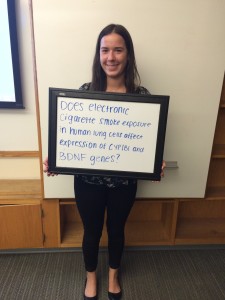The Short Term Educational Experiences of Research in Environmental Science for Undergraduates (STEER) Program is a ten week summer internship awarded to undergraduate students interested in environmental health. Through a collaboration between the CEET, the Center for Public Health Initiatives and multiple schools and faculty at Penn, the STEER program provides didactic experiences in environmental and public health, as well as research mentorship opportunities in a variety of areas of environmental exposures and health effects. The COEC will be highlighting the achievements and experiences of 2015 STEER students below.
 Sara Hartenbaum
Sara Hartenbaum
My name is Sara Hartenbaum and I am currently a rising junior at the University of Maryland. My major is Environmental Science with a concentration in Environmental Health. Although my plans for after graduation are still undecided, I have considered everything from medical school to law school to a master’s in public health or even pursuing a career in the field of environmental science. Participating in the STEER program allowed me to add biomedical research to this list of possibilities.
What is your summer research project?
This summer, I had the opportunity to work at Airways Biology Initiative as part of the STEER program. Although this was my first time working in a research lab, my coworkers and mentors were very helpful in teaching me essential lab procedures and techniques. By working with researchers in both Dr. Krymskaya and Dr. Panettieri’s lab, I gained valuable knowledge and experience in the field of asthma and rare lung diseases such as Lymphangioleiomyomatosis (LAM). Additionally, attending weekly lab meetings allowed me to learn about all of the research that is taking place at ABI as well as the discoveries that my peers and mentors are making.
What are the implications of your research?
The project that I worked on involved observing the expression of CYP1A1 and CYP1B1 genes in response to electronic cigarette smoke exposure. These genes respectively encode for the CYP1A1 and CYP1B1 enzymes, which, as part of the cytochrome P540 enzyme family, are responsible for metabolizing drugs and other toxins within the body. Although the activity of the CYP1A1 and CYP1B1 enzymes has already been studied in traditional cigarette smoke, research on the effect in electronic cigarettes is still relatively new.
What new skills have you gained through this experience?
With the STEER program, I attended weekly field trips and lectures that addressed various topics in Environmental Health. These experiences enhanced what I learned in the lab at ABI by allowing me to see first-hand how the research being conducted there applies to the real world. Overall, my experience in the STEER program has been extremely valuable and rewarding.




